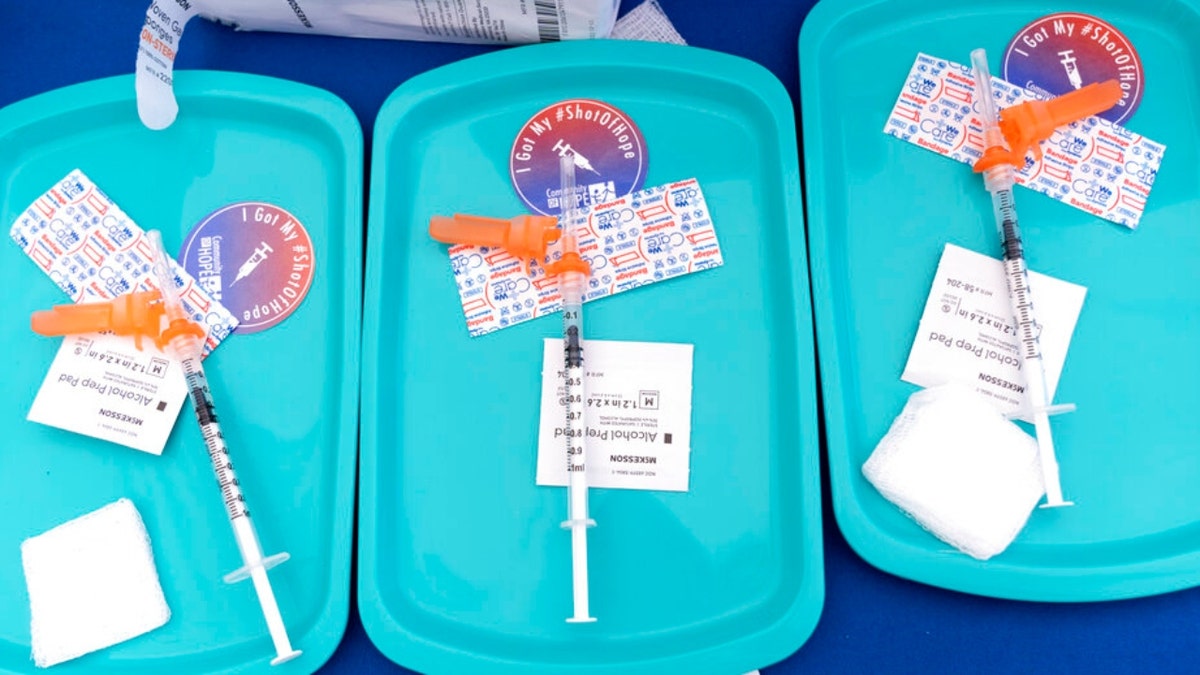Fox News Flash top headlines for October 20
Fox News Flash top headlines are here. Check out what's clicking on Foxnews.com.
The Pfizer/BioNTech COVID-19 vaccine is 93% effective against COVID-19 hospitalization in youth, according to a U.S. Centers for Disease Control and Prevention study.
The CDC said that among hospitalized patients in the U.S. ages 12 to 18 years, the effectiveness of two doses of Pfizer/BioNTech vaccine against COVID-19 hospitalization from June through September of this year was 93%.
The findings of the study, the agency said, could help to reinforce the importance of vaccination to protect U.S. youths against the virus.
In order to reach these conclusions, the CDC looked at this effectiveness in a test-negative, case-control study at 19 pediatric hospitals in 16 states, including 179 hospitalized case-patients and 285 controls.
Forty-three percent of the case-patients were admitted into an intensive care unit, 16% received life support during hospitalization and 2% of those critically ill patients died.
The agency noted that all 29 critically ill case patients and both deaths occurred among unvaccinated case patients.
Seventy-two percent of those analyzed had at least one underlying condition, including obesity, and 68% attended in-person school.

Pfizer COVID-19 vaccine doses are prepared for members of the community 12 years and up, Wednesday, May 19, 2021, at a clinic held by Community of Hope, outside the Washington School for Girls in southeast Washington. (AP Photo/Jacquelyn Martin)
The case patients were hospitalized with symptomatic COVID-19-like illness and a positive SARS-CoV-2 reverse transcription–polymerase chain reaction or antigen test result.
Information regarding baseline demographic characteristics, clinical information about the current illness and SARS-CoV-2 testing history were obtained through parent or guardian interviews as well as the review of electronic medical records.
Patients were considered to have received COVID-19 vaccination based on source documentation or by plausible self-report, though neither the Moderna vaccine nor the Johnson & Johnson vaccine were authorized for people less than 18 years of age at the time of the evaluation.
The study notably included persons categorized as unvaccinated or fully vaccinated and patients with partial vaccinated were discluded from the analysis.
FDA PANEL ENDORSES JOHNSON & JOHNSON COVID-19 VACCINE BOOSTER WITH 2-MONTH GAP FOR AGES 18 AND UP
The researchers used "descriptive statistics" to compare the characteristics of case patients and controls, including Pearson chi-square tests or Wilcoxon rank-sum test and vaccine effectiveness against COVID-19 hospitalization, which was calculated by comparing the odds of full COVID-19 vaccination among case patients and controls, determined from logistic regression models.
Models were adjusted for the U.S. Census region, the calendar month of hospital admission, age, sex and race/ethnicity. While underlying health conditions and social vulnerability index were also assessed, they were not included in the final model because they did not change the odds ratio of vaccination by more than 5%.
Sensitivity analyses were performed and vaccine effectiveness was also stratified by age groups in addition to statistical analysis that was reviewed by the agency and other participating institutions.
Case patients more frequently resided in areas with higher social vulnerability, and vaccination coverage was 3% among case patients and 33% among controls.
Diabetes was more prevalent among case patients, while neurologic or neuromuscular disorders were more prevalent among controls.
While the findings were reportedly consistent with efficacy data from the Pfizer/BioNTech clinical trial among persons ages 12–15 years, the CDC wrote that that trial had not been powered to assess efficacy against hospitalized COVID-19.
CLICK HERE TO GET THE FOX NEWS APP
The CDC pointed out that, as of Monday, 46% of U.S. children and adolescents 12–15 years old and 54% of those 16–17 years old were fully vaccinated against COVID-19.
"These data suggest that increasing vaccination coverage among this group could reduce the incidence of severe COVID-19 in the United States. Further, as in-person school attendance increases, multicomponent preventive measures to reduce the incidence of severe COVID-19 among adolescents, including vaccination, are imperative," the researchers concluded.
The White House announced Wednesday that children 5 to 11 years old would be able to get a Pfizer/BioNTech COVID-19 shot in a matter of weeks.
The Associated Press contributed to this report












































